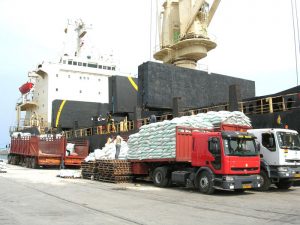The Managing Director of the Bulk Oil Storage and Transportation Company, BOST, Edwin Provencal, says there is the need for the BOST margin in the petroleum price build-up to be increased from 3 pesewas to 12 pesewas.
He says the current margin is woefully inadequate to put the company in a strategic position to fix its equipment which are obsolete.
Mr. Provencal made these remarks when he met some Civil Society Organizations in the energy sector and a cross section of the media in Tema.
Making reference to the poor state of some equipment during a site visit at the BOST depot in Tema, Mr. Provencal explained why it is necessary to boost revenue to aid in their upgrade.
This, he said could be done via an upward adjustment of the BOST margin by nine pesewas.
His call is also premised on the fact that the facility will need about 150 million dollars to put its infrastructure in good shape.
“You can see that a lot of our infrastructure are old. Some of them are as old as 26 years. A lot of them have broken down. We have almost 4 tanks here, which are out of service and we need money to fix them. Now the BOST margin was solely meant for infrastructure maintenance. In 2011, the BOST margin was given to us at 3 pesewas. We are in 2020, some 9 years down the line where the dollar value has depreciated by 75%, but we are still getting the same 3 pesewas. That is why the infrastructure is falling apart,” he said.
“Now we have to do something about it. We cannot, as Ghanaians leave this strategic asset to rot away. We are trying our best but we need help, hence the cry for help and for Ghanaians to support the increment of the BOST margin from 3 pesewas to at least some 12 pesewas if possible, so that we can deliver our mandate to the people of Ghana, ” he added.
He further noted that, “In total, we would need about 150 million dollars to fix our infrastructure, but I mean we are not asking all of that from the government. All we are asking from the government is that it should give us the BOST margin so we can be equipped to maintain the existing infrastructure.”
He however says there is a plan to upgrade and automate the whole depot to improve efficiency.
“There are other projects we have to do, like upgrade and automate the whole depot which comes to about 47 million dollars. The other small projects that we have to undertake to enhance the efficiency of the depot also cost about 20 something million dollars. Those ones we can engage appropriate funding sources for some money because the projects can pay back,” he said.
Some Civil Society Organizations including the Chamber of Petroleum Consumers (COPEC), and the Institute of Energy Security (IES), also agreed that if the margin is increased, BOST can be in a position to hedge its prices to ensure stability in fuel prices in the country.
“The only assurance we need is that whatever additional resource that government would have to pump in, whatever resources Ghanaians would add together to give to BOST, we would need that assurance that 6 months or 1 year from now, if we were to come back here to do this field trip or visit, the story here would be different. Where you would not find either of the tanks rusting or decommissioned and are not working and pipelines that should have been upgraded to about 12 inches, are still doing 6 and 8 inches. That means that your flow rate is going to be quite low and that means you will lose all your competitive edge that you would have had in the downstream, Executive Director of COPEC stated.
“We are tempted to say that the new BOST agenda that the new MD is introducing could go far on condition that he will do as he says, on condition that other politicians will stay away and allow him the free hand to operate professionally. We have said that once BOST is sound, the incessant increase in fuel prices that we witness on Friday, Saturday, Sunday, and even on public holidays would be managed. As a country this is the best company in Ghana that can hedge,” he added.
The Institute of Energy Security, IES, also urged government to divert the prize stabilization levy to BOST.
“If they mean what they say, it would be a good call for all Ghanaians to support. One other thing we have come to realize as a Civil Society Organization from the desk of IES is that, the price stabilization recovery levy has not been able to stabilize prices for us. The low prices we see today is just coming from the gains we have gotten from the world market, and so we may consider or government can consider diverting this price stabilization recovery levy to BOST, so that they can have enough funds to procure fuel, maintain their tanks and store enough fuel to manage both supply and price risk.”
Source: Citinewsroom.com






